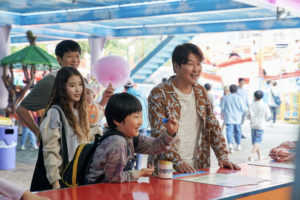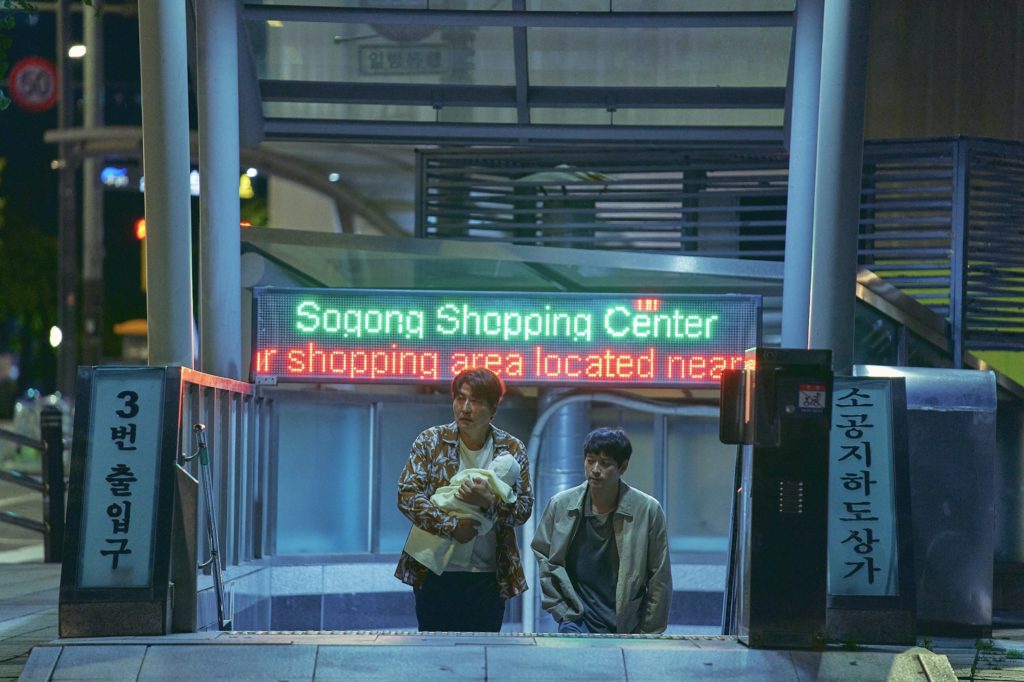A common, and not entirely unfair, rejoinder to the pro-life movement is that it focuses on ensuring life but with little concern for whether that life thrives after. Even if you spare the child, what of the many years after that? Even if a fetus is a life by all technical definitions, is it a life worth living?
The new film “Broker” from Hirokazu Kore-eda (a Japanese filmmaker directing an all-Korean cast) quietly yet firmly insists that it is. Sang-hyeon (Song Kang-ho) and Dong-soo (Gang Dong-won) call themselves brokers, a euphemistic cover for what’s really a human trafficking operation.
A local church has a “baby box,” where mothers can legally abandon unwanted infants. Assuming no one will miss what they are quite literally tossing in a bin, the pair steal the babies and sell them to parents who can’t afford the cost or wait for the official adoption process (warning: spoilers ahead).
It’s the perfect crime — until one mother, So-young (Lee Ji-eun), has an immediate change of heart and returns to the church, only to find no record and no baby. Sang-hyeon and Dong-soo are forced to reveal their scheme to her. Instead of alerting the authorities, the young mom decides to partake and get a cut. The bribery wouldn’t have mattered, as the authorities already do know: the trio is trailed by two detectives waiting to catch them in an actual transaction for a legitimate bust.
This would all make for one cracking thriller, but what Kore-eda gives us instead is something far more daring: a family feature.
These characters are all outcasts, inconvenient truths that a happy society tries to paper over. Sang-hyeon is a divorced ex-con whom his own child seems embarrassed by. So-young is a prostitute who refers to her madam as “mom.”
Dong-soo has a personal investment in their trade, having been a baby box child himself: He’d rather see the babies placed with parents who actually want them rather than languish in an orphanage. On a visit back to his childhood home, another orphan, Hae-jin (Im Seung-soo), stows away in his van and is thus required to accompany them on their sales trip.

This is a motley crew bound together by necessity. But then again, the film seems to ask, isn’t that true of every family? Forced to care for an infant they are trying to sell, what starts as a mere cover story bleeds into sincerity. In one particularly moving scene, the “family” rushes to the hospital when the baby develops a common fever, fussing and fretting over him.
But if the baby is infectious with anything, it’s with innocence. Prolonged exposure to the little baby, Woo-sung, melts away the rejections and the lies they have told themselves. One such lie is that new life is a burden, when we see that if anything it has lightened the load.
It even heals the wounds of the past. At the top of a Ferris wheel, Dong-soo confesses his resentments to So-young, particularly toward the mother who abandoned him.
“I can’t forgive her,” he admits, “but I can forgive you.”
That such love can appear within such a heinous act of human trafficking is one of several contradictions in the film. For all their talk of altruistic intentions, the brokers still prioritize cash over ethics. The pursuing police are more invested in selling the baby than the makeshift family is, spurring or arranging sales to make sure they are caught in the act. And most dramatically of all, So-young killed the baby’s father when he insisted she abort, not the most seamless of pro-life garments. But Kore-eda’s storytelling embraces all: A life without paradoxes simply isn’t life. There are no straight lines in nature, let alone humanity.
So-young is often questioned about her choice, with most characters insisting that it would have been far kinder to everyone involved if she had simply aborted. The detective wonders this out loud on stakeout, her hand pinning a fallen blossom to the driver’s side window. Without saying it, we sense that she too is an outcast, on the outside looking in.
So-young doesn’t have an answer for this simple query, and perhaps doesn’t need one; little Woo-sung is justification personified. Life doesn’t have to qualify itself; if it did, then I doubt any of us would live up to the metric. It’s true that abortion would spare him and society any suffering. But that, the film suggests, would be like burning the rainforest to keep sap off your clothes.
The climax of the film is its quietest scene. The crew lounges in a hotel room, when little Hae-jin insists that So-young tell the baby that she loves him. Trying to keep her emotional distance, she demurs, but compromises to say that she’s glad he exists. But she then extends that to the other three members of the “family.” What started as a concession blossoms into something far deeper. Each of them is reminded that their existence isn’t a burden. They are loved for simply who they are, with nothing to earn or make up for.
Of course, this is all grossly sentimental, but a wise man once said that if something is true, it is not sentimental. We dismiss such romanticism out of hand because we fear what we could become. Or worse yet, what we already are.
“Broker” is currently showing in a limited selection of Los Angeles-area theaters.

